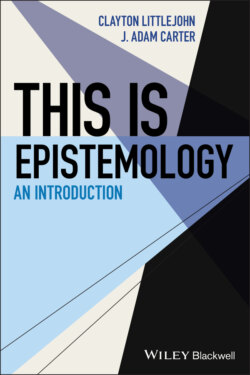Читать книгу This Is Epistemology - J. Adam Carter - Страница 14
Notes
Оглавление1 1 For a comprehensive overview of late‐twentieth‐century literature on the analysis of knowledge, see Borges et al. (2017) and, for more advanced discussion, Shope (1983). See also Dutant (2015) and Ichikawa and Steup (2017) for helpful discussion of the analysis of knowledge as a philosophical project.
2 2 “If and only if” can be abbreviated to “iff.”
3 3 In English grammar, a “that” clause is a subordinate clause that begins with the word “that”.
4 4 We should note that the matter of just how widely held this “justified, true belief” account of knowledge was prior to the 1960s – when it was famously challenged by Ed Gettier (1963) – is somewhat contentious. Gettier himself thought that Ayer and Chisholm, as well as Plato, embraced the account, and this has been often taken for granted. Rosa Antognazza (2015) and Julien Dutant (2015) have recently argued that the received version of the history of the justified, true belief account is in fact inaccurate.
5 5 See, especially, Williamson (2000).
6 6 This idea is often expressed as: there is no empirical knowledge, where empirical knowledge is knowledge whose sources derive in some way from sense experience.
7 7 In the Meditations, Descartes begins – in Meditation One – by raising two famous skeptical scenarios, one involving dreaming, and another involving an evil genius. The Descartes of this first Meditation was a skeptic in despair. But, and this is why we note that referring to Descartes as a skeptic is a bit misleading, Descartes' skeptical peril was merely temporary. By Meditation Two he already believes he has found the key to overcoming the skeptical challenges he'd previously posed.
8 8 This is an adaptation of a description of a skeptical case by Crispin Wright (2007, p. 27).
9 9 This bit of reasoning, as we'll see in Chapter 11, relies on what is called the “closure principle”; roughly, this principle says that if one knows something, p, and competently deduces something else, q, from p, while retaining one's knowledge that p, then one knows that q. As a brief exercise, think a moment about this principle and its implications for whether you can know you have a hand if you don't know you're not a victim of the Simulation scenario.
10 10 See, for example, Williamson (2000, pp. 2–5; 2017, pp. 163–165).
11 11 This “direction of fit” language owes a debt most notably to Anscombe (1957) and has been developed in various ways by (along with Williamson), Searle (1983), Humberstone (1992), Smith (1994), and Velleman (2000), among others.
12 12 For related discussion, see our treatment of direct realism in Chapter 2.
